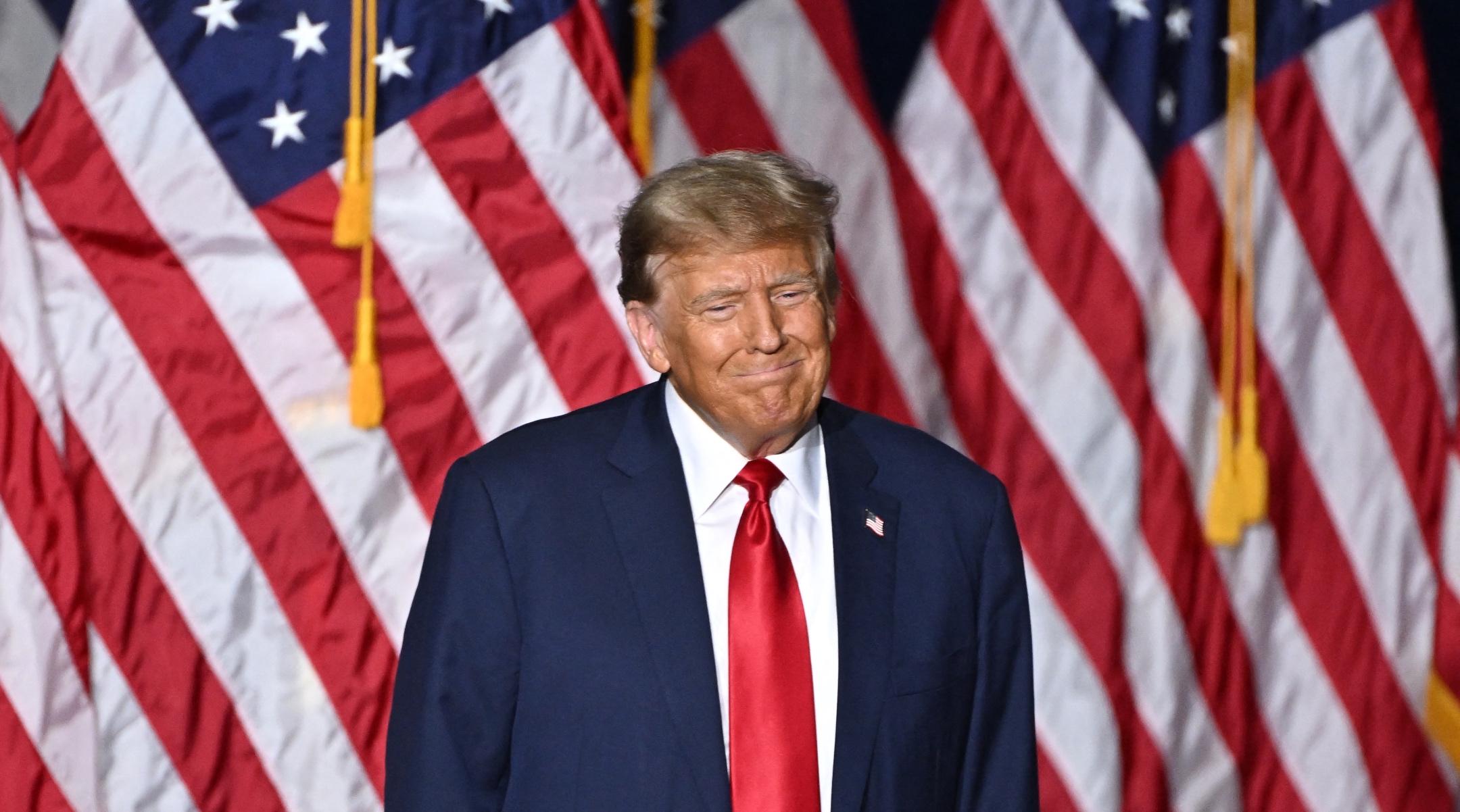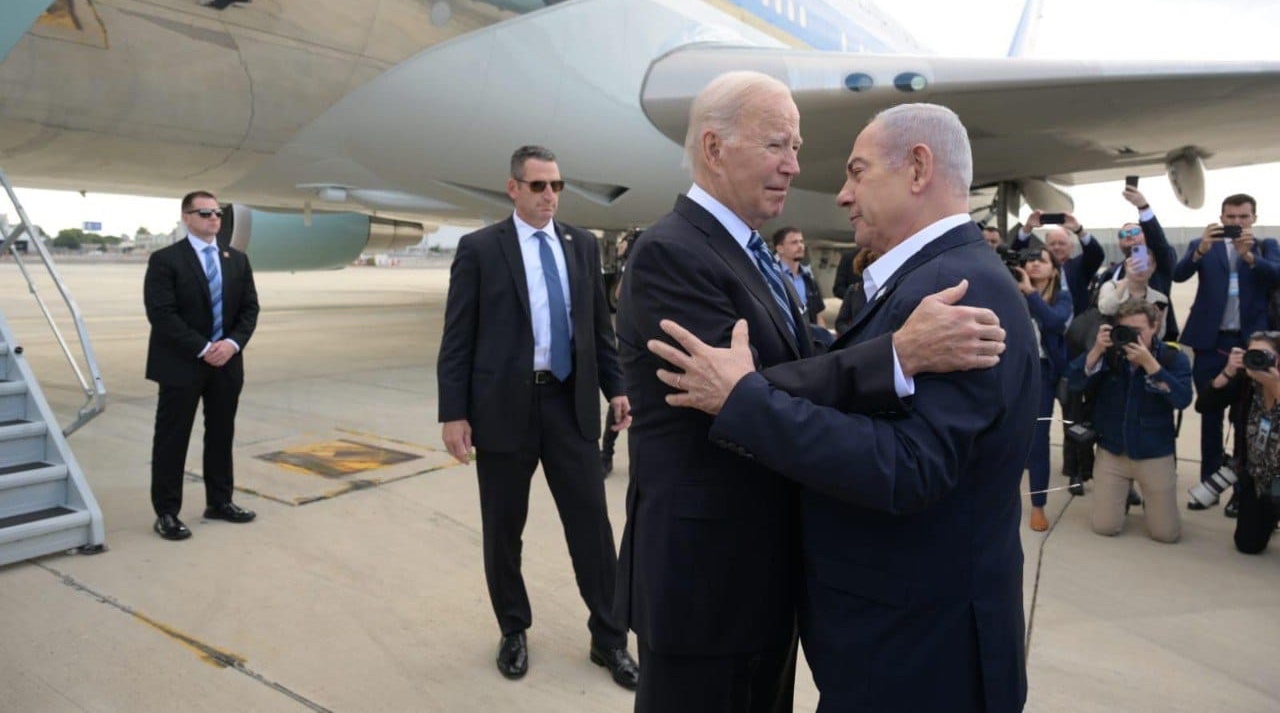How would Trump handle the war in Gaza if he were president?
As tensions increase between Joe Biden and Benjamin Netanyahu, Donald Trump is saying he would be a better ally to Israel in its war with Hamas

Former US President and Republican presidential hopeful Donald Trump attends a watch party during the 2024 Iowa Republican presidential caucuses in Des Moines, Iowa, Jan. 15, 2024. (Jim WATSON / AFP)
WASHINGTON (JTA) — For months, poll after poll has been clear on one thing: Most Americans don’t like the way Joe Biden is handling the Israel-Hamas war.
In December, a New York Times poll found that 33% of voters approved of his approach to the war, and earlier this month, an AP poll put the number at 31%. And the divide isn’t just partisan: The AP poll found that most Democrats also disapproved of Biden’s Gaza war policy, which has backed Israel’s aims.
Still, there are concrete signs that the dissent could tank Biden’s reelection chances: This week, 100,000 people voted “Uncommitted” in the Michigan Democratic primary, many of them in protest of Biden’s staunch support of Israel.
But Biden isn’t the only candidate cruising to his party’s nomination: As the November election nears, a rematch between Biden and former President Donald Trump appears all but certain. And if a significant number of voters ditch Biden over Israel, it would likely be a boon for his Republican predecessor and opponent.
So what would Trump do about the war if he were elected president?
The former president has not released a detailed plan on the war, but arguments from Trump and his supporters focus on his support for Israel during his first term, and his posture toward Iran, an ally and funder of Hamas.
While many of the loudest Biden critics accuse the president of being too deferential to Israel, Trump takes the opposite tack: He says Biden is putting Israel in danger. Democrats argue, meanwhile, that Trump’s isolationist bent, unpredictability and lingering animosity toward Israeli Prime Minister Benjamin Netanyahu would also be bad for Israel.
Trump has given no indication that he would be more sympathetic to Palestinian claims, nor that he would place more pressure on Israel to agree to a ceasefire.
“The approach of the United States would be that Israel needs to win this war, it was attacked brutally,” Trump’s ambassador to Israel, David Friedman, told the Jewish Telegraphic Agency, describing how Trump would act. Friedman is now a campaign surrogate for Trump.
“It is important for Israel, it is important for Israel’s neighbors as well, that Israel wins this war,” he said. “And the United States is not going to micromanage the war. They’re not going to tell Israel how to win.”
In his classic style, Trump threads his criticisms of Biden’s handling of Israel through a litany of his other favored subjects — ranging from Mexico to China to the American left to his false claims about winning the 2020 presidential election.
At the conservative CPAC gathering earlier this month, Trump said Israel was safer when he left office in January 2021. He homed in on Iran’s financial and logistical support for Hamas, and said his pressure on Iran had left the country unable to support its proxies. In 2018, Trump withdrew from the nuclear deal negotiated with Iran by Barack Obama, and imposed more stringent sanctions on Iran.
“Iran was broke and they had no money for Hamas, and they had no money for Hezbollah. They had no money for anything,” Trump said. “They were down to almost nothing, and there were a lot of stories that Iran was unable — that all these terror groups were angry at Iran because they weren’t paying and the terror groups were all breaking up.”
In the speech, he added, “If I were president, Israel would have never been attacked, would have never been.” He also claimed, without elaborating, that if he loses in November, Hamas and Antifa, the left-wing anti-fascist movement, would “terrorize our streets” and that their ideology would “take over our schools.”
There is no evidence that the terror groups funded by Iran were breaking up in 2020, as Trump claims. But according to congressional testimony in late October by Gabriel Noronha, an analyst from the conservative Jewish Institute for the National Security of America, Iran did cut funding to Hamas. Trump’s sanctions put Hamas on an “austerity plan,” he said.
Iran’s oil exports since then have skyrocketed. But the change has come mostly because China — which has become increasingly antagonistic to the United States under both Trump and Biden — has favored Iran’s cheap, high quality petroleum. Iran has resumed its funding for the Gaza terrorist group and it is now at “record highs,” Noronha said.
Biden has added sanctions on Iran since Trump left office. But Trump’s advisers blast Biden for a deal last year that traded the release of $6 billion in Iranian assets for the freedom of Americans held in Iranian prison. Biden administration officials say the money is strictly controlled and is only available for humanitarian purposes. Trump advisers counter that it frees up funds for Iran’s regional aggression.
“The money that now Iran is using to sell oil, the money that you cut off to the Palestinians that they now have, the money you cut off to the United Nations that they still have, all of this was the lubricant that enabled Hamas to conduct their horrible attacks, and Hezbollah too,” said Friedman at the National Religious Broadcasters convention in Nashville, Tenn., on Feb. 22. “You cut it all off and President Biden brought it all back and so we really wish you never left office because we’re feeling the pain right now.”
Pro-Israel figures who favor Trump also note that Qassem Soleimani, the senior Iranian military leader, was assassinated in 2020, on Trump’s watch.
“Trump did not want to go to war with Iran, but he was willing to use force outside of Iran against Iran,” Joel Pollak, the senior editor at large at Breitbart News, a hardline right-wing news outlet that favored Trump in the 2016 and 2020 elections, said in an interview. (Biden, for his part, has targeted Iranian allies and proxies, and has not stood in the way of Israel targeting Iranian figures.)
Biden has embraced Israel since the outbreak of war on Oct. 7, traveling there, literally embracing Netanyahu and advocating for increased aid in an Oval Office address. Recently he’s become more critical of its leadership and military conduct, and pushed for more humanitarian aid. The United States has also spearheaded negotiations for a temporary ceasefire and hostage release.

President Joe Biden and Prime Minister Benjamin Netanyahu embrace on the tarmac at Ben Gurion Airport, Oct. 18, 2023. (Avi Ohayon, Israel Government Press Office)
Pro-Israel Democrats have lauded Biden’s stance. They caution that Trump’s increasingly isolationist leanings could bode poorly for American support for Israel. When it comes to another major global conflict, in Ukraine, Trump has steadfastly opposed giving aid to Kiev and has praised Russian President Vladimir Putin. His slogan remains “America First.”
“It’s hard to imagine when the going gets tough that Trump’s going to stick with Israel because the fact is, he doesn’t stick with anybody when the going gets tough,” said Mark Mellman, the CEO of the Democratic Majority for Israel.
Some of Trump’s Jewish allies want him to take an even harder line on Hamas in Gaza, including suggesting that he reduce humanitarian aid into the territory, which aid groups have warned is on the verge of starvation.
“Biden is directly aiding Hamas terrorists,” Chaya Raichik, the Jewish woman who runs the right-wing LibsOfTikTok social media presence, said in December on X, formerly Twitter. She attached a screenshot of stories alleging that humanitarian aid was reaching Hamas and not Gaza civilians.
Steven Cheung, the Trump campaign’s lead spokesman, did not return requests for comment, but a number of Trump’s surrogates, particularly Friedman, have been more specific in explaining how he would better handle Hamas.
In an interview, Friedman said Trump would give Israel a freer hand than Biden, who has pressured the Netanyahu government to be more precise in its attacks. Biden has called Israel’s bombing “indiscriminate” and has said that its conduct has been “over the top.”
Friedman also said Trump would not pressure Israel, as Biden has, to embrace the West Bank-based Palestinian Authority as a replacement for Hamas in Gaza in “day after” scenarios. Biden argues that the P.A., after reforms, is the best option for a functioning Palestinian government in Gaza.
Trump cut off contact with the Palestinian Authority president, Mahmoud Abbas, when Abbas objected to Trump’s 2017 recognition of Jerusalem as Israel’s capital. His allies, along with much of the pro-Israel right, castigate the P.A. for providing salaries to Palestinian terrorists and their families, and say Abbas incites his constituents to violence.
“This guy is never going to deliver anything good,” Friedman said of Abbas. “He continues to pay terrorists, he continues to spout these antisemitic slogans. I mean, he’s a bad guy.”
When he was in office, Trump was particularly close with Netanyahu, who is also on the right. But the relationship soured after 2020, when Netanyahu congratulated Biden on his victory. Trump falsely claims that he won the election and saw the standard congratulatory message as a betrayal. The following year, Trump reportedly said of Netanyahu, “F— him.”
The acrimony has persisted. In the immediate aftermath of Hamas’ Oct. 7 invasion of Israel, Trump shocked Israelis by attacking Netanyahu.
“I will never forget that Bibi Netanyahu let us down,” he said. “That was a very terrible thing.”
The DMFI’s Mellman said Trump’s fickle attitude was bad for Israel. He noted Trump’s praise for Putin.
“Donald Trump is as inconsistent a human being as exists in our world,” he said. “I’m not really sure that a pro-Putin Trump, anti-Europe Trump, someone who walks away from our other allies, is necessarily going to stand with Israel when the going gets tough.”
Trump and his Republican allies in Congress have in recent weeks frustrated the pro-Israel commmunity by blocking the emergency transfer of $14.1 billion in defense assistance to Israel. Trump has suggested converting aid to Israel, currently a grant, to a loan.
Pollak, the Breitbart editor, said Trump’s unpredictability was an asset for Israel. He noted that Biden has nurtured ties with Qatar in a bid to get the country to leverage its relationship with Hamas to bring about the release of Israeli hostages in Gaza.
Trump, Pollack said, would be willing to take a harder line in negotiations.
Trump “would have used the stick of moving the base,” Pollak said, referring to the massive U.S. military base in the Gulf country. “And maybe he would be saying to the Hamas leaders who are still holed up in Gaza, ‘I will let you survive individually, you can join your billionaire friends in exile, if you give up the hostages. He has a broader toolbox because he was willing to think outside the box and be unpredictable.”
This article originally appeared on JTA.org.
A message from our Publisher & CEO Rachel Fishman Feddersen

I hope you appreciated this article. Before you go, I’d like to ask you to please support the Forward’s award-winning, nonprofit journalism so that we can be prepared for whatever news 2025 brings.
At a time when other newsrooms are closing or cutting back, the Forward has removed its paywall and invested additional resources to report on the ground from Israel and around the U.S. on the impact of the war, rising antisemitism and polarized discourse.
Readers like you make it all possible. Support our work by becoming a Forward Member and connect with our journalism and your community.
— Rachel Fishman Feddersen, Publisher and CEO



























